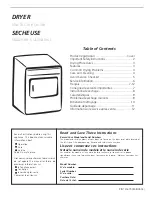
4
CHECK YOUR VENT SYSTEM FOR GOOD AIR FLOW
Good air flow
Along with heat, dryers require good air flow to
efficiently dry laundry. Proper venting will reduce your
drying times and improve your energy savings. See
“Installation Instructions.”
The venting system attached to the dryer plays a big role in
good air flow.
Service calls caused by improper venting are not covered
by the warranty and will be paid by the customer, regardless
of who installed the dryer.
Maintain good air flow by:
Good
Better
USE SENSOR DRY CYCLES FOR BETTER FABRIC CARE
AND ENERGY SAVINGS
Use the SENSOR DRY cycles to provide the most energy savings and enhanced fabric care from the dryer. During SENSOR DRY
cycles, drying air temperature or moisture level are sensed in the load. This sensing occurs throughout the drying cycle and the
dryer shuts off when the load reaches the selected dryness. The Energy Preferred cycle will provide optimal energy savings.
With Timed Dry, the dryer runs the amount of time set and sometimes results in shrinkage, wrinkling, and static due to over-drying.
Use Timed Dry for the occasional damp load that needs a little more drying time or when using the drying rack.
n
Cleaning your lint screen before each load.
n
Replace plastic or foil vent material with 4" (102 mm)
diameter heavy, rigid vent material.
n
Use the shortest length of vent possible.
n
Use no more than four 90° elbows in a vent system;
each bend and curve reduces air flow.
n
Remove lint and debris from the exhaust hood.
n
Remove lint from the entire length of the vent system at
least every 2 years. When cleaning is complete, be sure
to follow the “Installation Instructions” supplied with your
dryer for final product check.
n
Clear away items from the front of the dryer.
Summary of Contents for W10873035A
Page 2: ...2 DRYER SAFETY ...
Page 3: ...3 ...
Page 14: ...14 SÉCURITÉ DE LA SÉCHEUSE ...
Page 15: ...15 ...





































